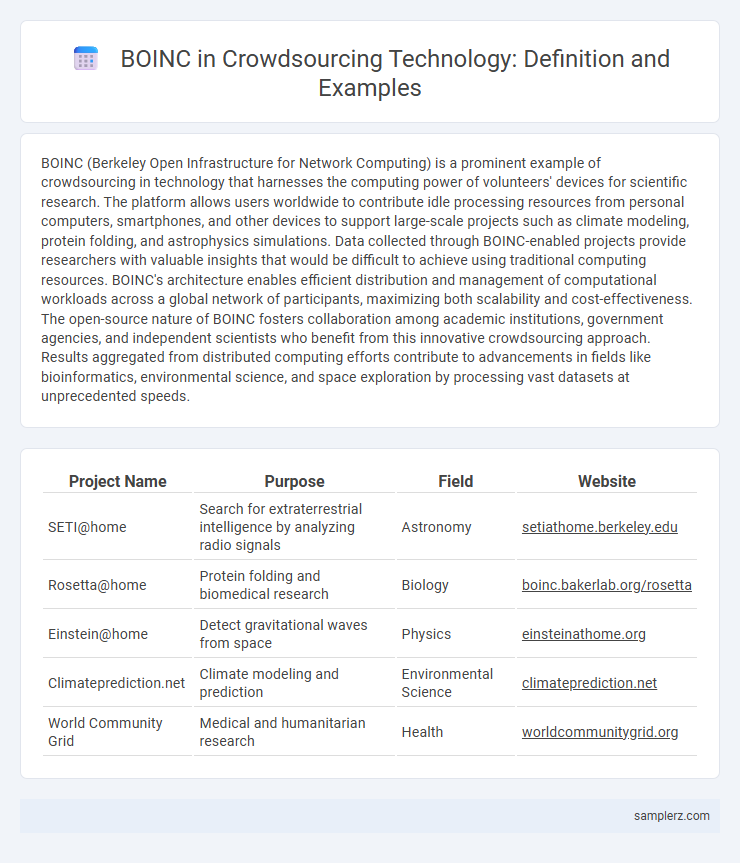BOINC (Berkeley Open Infrastructure for Network Computing) is a prominent example of crowdsourcing in technology that harnesses the computing power of volunteers' devices for scientific research. The platform allows users worldwide to contribute idle processing resources from personal computers, smartphones, and other devices to support large-scale projects such as climate modeling, protein folding, and astrophysics simulations. Data collected through BOINC-enabled projects provide researchers with valuable insights that would be difficult to achieve using traditional computing resources. BOINC's architecture enables efficient distribution and management of computational workloads across a global network of participants, maximizing both scalability and cost-effectiveness. The open-source nature of BOINC fosters collaboration among academic institutions, government agencies, and independent scientists who benefit from this innovative crowdsourcing approach. Results aggregated from distributed computing efforts contribute to advancements in fields like bioinformatics, environmental science, and space exploration by processing vast datasets at unprecedented speeds.
Table of Comparison
| Project Name | Purpose | Field | Website |
|---|---|---|---|
| SETI@home | Search for extraterrestrial intelligence by analyzing radio signals | Astronomy | setiathome.berkeley.edu |
| Rosetta@home | Protein folding and biomedical research | Biology | boinc.bakerlab.org/rosetta |
| Einstein@home | Detect gravitational waves from space | Physics | einsteinathome.org |
| Climateprediction.net | Climate modeling and prediction | Environmental Science | climateprediction.net |
| World Community Grid | Medical and humanitarian research | Health | worldcommunitygrid.org |
Understanding BOINC: Bridging Research and Crowdsourcing
BOINC (Berkeley Open Infrastructure for Network Computing) exemplifies the power of crowdsourcing by connecting volunteers' computing resources with scientific research projects globally. This platform enables researchers in fields such as astrophysics, climate science, and medicine to process vast datasets through distributed computing, significantly accelerating discoveries. By transforming idle computer time into valuable contributions, BOINC demonstrates an efficient bridge between public participation and advanced scientific inquiry.
Key BOINC Platforms Powering Scientific Discovery
BOINC (Berkeley Open Infrastructure for Network Computing) supports revolutionary crowdsourcing projects like SETI@home, Folding@home, and Climateprediction.net, harnessing global volunteer computing power to advance scientific research. These key BOINC platforms enable large-scale data processing for astrophysics, molecular biology, and climate modeling by distributing complex computations across millions of personal computers. Leveraging BOINC's open-source framework accelerates discoveries in fields such as space exploration, disease research, and environmental science through decentralized computational crowdsourcing.
How BOINC Enables Volunteer Computing in Crowdsourcing
BOINC (Berkeley Open Infrastructure for Network Computing) enables volunteer computing in crowdsourcing by distributing complex computational tasks across thousands of personal computers worldwide. This platform harnesses idle processing power to perform large-scale scientific research projects, such as protein folding and climate modeling. By utilizing a decentralized network of volunteers, BOINC significantly accelerates data analysis while reducing costs associated with traditional supercomputing resources.
SETI@home: Crowdsourcing the Search for Extraterrestrial Life
SETI@home exemplifies crowdsourcing in technology by harnessing the collective computing power of millions of volunteers worldwide through the BOINC platform. This distributed computing project analyzes radio signals for signs of extraterrestrial intelligence, leveraging idle processing capacity on personal computers. By utilizing volunteer resources, SETI@home accelerates data analysis, making large-scale scientific research more efficient and cost-effective.
Folding@home: Advancing Medical Science through Collective Computing
Folding@home exemplifies BOINC's potential in crowdsourcing by harnessing distributed computing power from millions of users worldwide to simulate protein folding processes. This collective computing effort accelerates research on diseases like Alzheimer's, cancer, and COVID-19 by enabling complex molecular dynamics simulations that would be impossible on traditional supercomputers. Leveraging the massive data processing capabilities of volunteer computers, Folding@home significantly advances medical science through collaborative technology-driven solutions.
ClimatePrediction.net: Harnessing Crowds for Climate Modeling
ClimatePrediction.net utilizes BOINC's crowdsourcing platform to engage thousands of volunteers in running complex climate models on their personal computers, significantly increasing computational power. This distributed approach enables more accurate and extensive simulations of climate patterns, improving predictions of future climate change scenarios. By harnessing collective processing resources globally, ClimatePrediction.net accelerates scientific research and enhances climate model reliability.
Rosetta@home: Community-driven Protein Structure Research
Rosetta@home, a project within the BOINC platform, harnesses the collective computing power of volunteers worldwide to predict protein structures, aiding in biomedical research and drug discovery. By utilizing distributed computing, Rosetta@home accelerates the analysis of protein folding, which is essential for understanding diseases like Alzheimer's and cancer. This community-driven approach exemplifies the potential of crowdsourcing in computational biology and scientific innovation.
LHC@home: Empowering Physics Breakthroughs via BOINC
LHC@home utilizes the BOINC platform to harness the computing power of volunteers worldwide, enabling complex simulations for particle physics research at CERN's Large Hadron Collider. By distributing workloads across thousands of devices, LHC@home accelerates data analysis and model validation critical to discoveries in fundamental physics. This crowdsourcing approach significantly reduces the cost and time required for high-energy physics experiments, pushing the boundaries of scientific knowledge.
Einstein@home: Volunteer Computing in Space Science
Einstein@home leverages the BOINC platform to enable volunteers worldwide to contribute their computer's idle processing power for analyzing astronomical data, accelerating the discovery of gravitational waves and pulsars. This crowdsourcing initiative harnesses distributed computing to process vast datasets from observatories like LIGO and Arecibo, enhancing space science research efficiency. By utilizing volunteer computing, Einstein@home exemplifies scalable, cost-effective scientific collaboration in astrophysics.
Future Trends: Expanding BOINC’s Role in Crowdsourced Innovation
BOINC's future in crowdsourcing innovation is marked by integrating AI-driven task allocation to enhance computational efficiency across diverse scientific projects. Expansions include incorporating blockchain for secure data sharing and incentive mechanisms, broadening participant engagement globally. The platform's evolution aims to harness edge computing and IoT devices, exponentially increasing processing power and accelerating breakthroughs in fields like climate modeling and biomedical research.

example of BOINC in crowdsourcing Infographic
 samplerz.com
samplerz.com